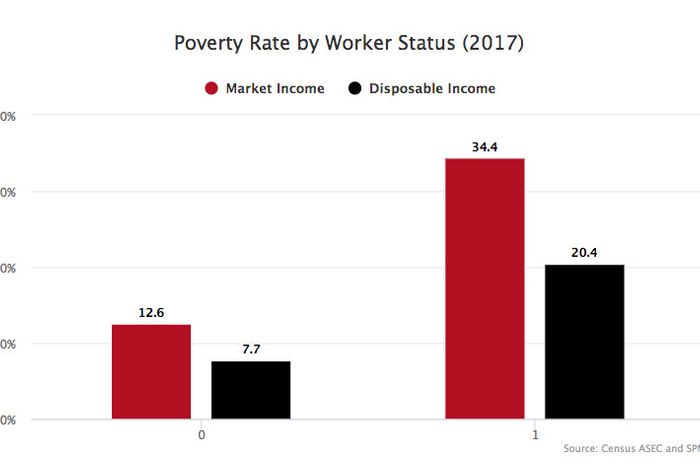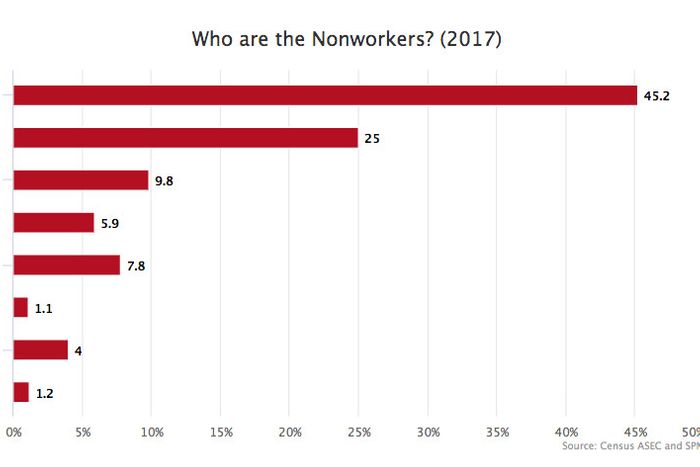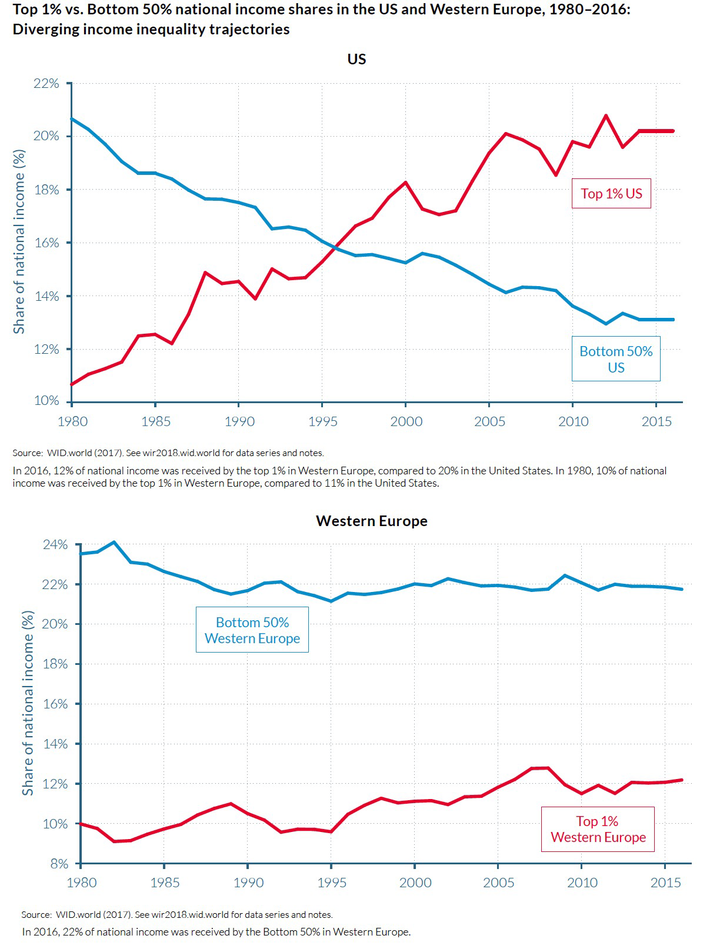
David Brooks’s latest column asserts that, in the United States, workers’ wages are determined largely by the value of what they produce. The quality of the well-paid pundit’s ensuing argument fatally undermines its own premise.
Brooks frames his case as a jeremiad against “Theyism” — which is to say, the belief that there is a “malevolent, elite ‘they’ out there” who “are destroying life for the rest of us.” Brooks argues that the malevolent politicians who engage in this rhetorical mode — namely Bernie Sanders and Donald Trump — take a “genuine tension in society” and blow it up “into an all-explaining cartoon in which one part of America is trying to destroy the other part.”
The columnist proceeds to sketch out an all-explaining cartoon in which the They-ists are trying to destroy the capitalist system that is working so well for the rest of us.
Specifically, Brooks posits that Bernie Sanders’s “class-war Theyism” — which holds that “billionaires have rigged the economy to benefit themselves and impoverish everyone else” — is plainly false. What follows is exceptionally dense with fallacies, even for a David Brooks column, and so it’s worth breaking his argument into two parts. Here’s the first:
Sanders starts with a truth: Workers need more bargaining power as they negotiate wages with their employers. But then he blows this up into an all-explaining ideology: Capitalism is a system of exploitation in which capitalist power completely dominates worker power. This ideology crashes against the facts.
In the first place, over the past few years wages for workers toward the bottom of the income scale have been rising faster than wages for those at the top. If the bosses have the workers by the throat, how can this be happening?
Already, our columnist’s ideology has crashed against multiple facts. The first, and most fundamental, is that Bernie Sanders’s does not argue that “capitalist power completely dominates worker power” in the United States. On the contrary, the socialist senator has pushed for reforming America’s labor laws to promote unionization on the grounds that while one worker has “no strength,” when “when we stand together then we have some power.” If Sanders believed that it was impossible for ordinary people to meaningfully improve their economic circumstances in a capitalist economy — because in such an economy, capitalists exert complete domination over workers — then his campaign would have no reason to exist. It may seem unfair to suggest that Brooks is using the word completely in a literal sense. But his own rhetorical question confirms that he is: The fact that wages are rising modestly for low-income workers, after years of stagnation, only refutes Sanders’s ideology if one posits that the socialist senator believes no worker has ever gotten a raise since the advent of wage labor.
The second problem with Brooks’s opening argument is that the answer to his rhetorical question actually does more to validate Sanders’s worldview than to rebut it: Wage growth at the bottom is happening, in no small part, because many states have taken the Vermont senator’s counsel and raised their minimum wages. As economist Ernie Tedeschi recently wrote for the New York Times:
The effective minimum wage has not only outpaced inflation in recent years, but it has also grown faster than typical wages … The average wage in the bottom third of the wage distribution — minimum-wage workers and others — has risen an average of 2.3 percent annually over the last three years after adjusting for inflation. The growth pressure from the wages of workers at or just around the minimum wage can account for between a quarter to a third of this growth.
Brooks comes no closer to earning his paycheck with the rest of his column. Here’s the abridged version:
Second, wages are still generally determined by skills and productivity. For example, Edward Lazear of Stanford University finds that between 1989 and 2017, productivity in mostly high-skill industries rose by roughly 34 percent and wages in those industries rose by 26 percent. Productivity in industries with mostly less-skilled workers rose by 20 percent while wages grew by 24 percent.
As Michael Strain of the American Enterprise Institute puts it, capitalism is doing what it’s supposed to do. It’s rewarding productivity with pay, and some people and companies are more productive. If you improve worker bargaining power, that may help a bit, but over the long run people can’t earn what they don’t produce.
Third, and most important, most of the increase in earnings inequality has happened between companies, not within them … Thus, the core problem is not capitalists exploiting their workers; it’s the rise of productivity inequality. It’s the companies and individuals who don’t have the skills to take advantage of new technologies.
The real solution, therefore, is not class war to hammer successful businesses. It’s to boost and expand productivity for everybody else. That’s done the old-fashioned way — by having better schools and better vocational training, by having more open competitive markets, by creating incentives to expand investment, by making sure superstar businesses don’t use lobbyists to lock in their advantages.
I have not closely scrutinized the research that Brooks cites. So I’ll stipulate, for the sake of argument, that all of it is irrefutable. Regardless, the columnist’s interpretation of the data he presents is fallacious in a wide variety of respects:
• To say that a worker earns what she “produces” — as measured by how much revenue she generates for her employer — is not to say that she earns what her labor is worth in some objective sense. Brooks does not assert the opposite explicitly, but the Michael Strain column he approvingly quotes does. “Capitalism produces unequal outcomes,” Strain writes. Such outcomes “are tolerable if people are getting, in some sense, what they deserve. But if wages aren’t determined by productivity — if hard work doesn’t pay off and if workers aren’t receiving just returns — then something has gone badly wrong with the system.”
One of the fastest-growing jobs in the U.S. economy is the position of home health aide. Such workers perform labor that is physically and mentally arduous, and profoundly socially necessary. If these individuals did not spend their days helping America’s elderly and disabled bathe, eat, brush their teeth, change their clothes, and take their medicines, it would be impossible for large swathes of our society to enjoy a minimally decent existence. And yet, the median annual income of an American home health aide was $24,200 in 2018.
Strain suggests that this fact is only morally troubling if the home health aide’s productivity is much higher than $24,200; and he defines productivity as “the amount of revenue workers generate for their employers.” Helping a Medicaid beneficiary use the toilet does not generate significant revenue for anyone. Therefore, by Strain’s reasoning, those who perform such labor do not deserve much income. By contrast, providing lots of rent-burdened home-health-care aides (among other working people) with usurious payday loans can generate significant income. Thus, executives at financial institutions that provide such loans earn hundreds of thousands (if not millions) of dollars each year.
Does that mean that everyone is getting, in some sense, what they deserve, and thus, that no one is being “exploited?” Or does it mean that a worker’s productivity is not a reliable measure of her contribution to society? When a mother reads to her children, or cares for a disabled sibling, do her efforts produce no value? Or do our economic metrics and institutions fail to acknowledge the obvious value of such efforts because they were formulated at a time when women were a subordinate caste whose contributions to social reproduction could be taken for granted? If we agree that care work has value — and that, in an aging society, we are going to have increasing demand for such work in the future — how can “more competitive markets” and vocational training possibly be the primary solution to the American working class’s plight?
• “If you improve worker bargaining power, that may help a bit, but over the long run people can’t earn what they don’t produce,” makes no sense, unless Brooks is endorsing full communism. In 2014, Americans in the top one percent of the income distribution earned, on average, about $764,000 from capital gains — which is to say, from the value of things they did not produce.
• Finally, even if Brooks’s entire analysis of how market incomes are distributed were flawless, his indictment of Sanders would still ring hollow. After all, the bulk of the Vermont senator’s platform is focused on equalizing posttax income. As Sanders summarized his outlook at a Democratic debate in October, “When you have a half a million Americans sleeping out on the street today, when you have 87 million people uninsured or underinsured … and then you also have three people owning more wealth than the bottom half of American society, that is a moral and economic outrage.” (Tellingly, Brooks’s takedown of Sanders’s ideology does not feature a single direct quote from the senator).
Here, Sanders argues that billionaires are “impoverishing” other Americans to the extent that they are blocking the creation of new social rights and protections. Although Sanders is also concerned with strengthening workers’ bargaining power, he maintains that equalizing the distribution of market income is insufficient. Eliminating poverty requires taxing the rich to finance health care, housing, child care, and other social benefits for ordinary workers. And he is indisputably correct.
As the People’s Policy Project’s Matt Bruenig has shown, poverty in the U.S. is overwhelmingly concentrated among the 51 percent of Americans who do not work.
And the vast majority of that 51 percent are people who should not be dependent on labor income — among them, children, the elderly, the disabled, carers, and students.
Even if there were a way to increase the measured productivity of those who perform socially necessary care work, this still would be insufficient to eliminate poverty. You need to progressively redistribute income in order to accomplish that. And American billionaires are, in fact, trying to prevent that from happening by “rigging” our political economy. Although there are some high-profile exceptions, about 64 percent of billionaire political donors give exclusively or primarily to Republican candidates and conservative organizations; which is to say, to a party and movement that opposes major expansions of the welfare state, and supports eroding the existing safety net’s fiscal security by slashing taxes on billionaires.
The billionaire class’s investment in the GOP is one reason why our historically wealthy nation has an aberrantly stingy welfare state. And our aberrantly stingy welfare state is a leading cause of our nation’s extraordinarily high levels of economic inequality. If Brooks’s thesis were correct — and America’s inequality problem were driven overwhelming by gaps in productivity rather than policy choices — then inequality in the U.S. and Western Europe should have grown at roughly similar rates over the past four decades, as both regions were subject to the same basic economic developments. But this did not happen, because Western Europe’s plutocrats aren’t quite as good at class war as the ones we’ve got over here.
Fortunately for Brooks, precisely because his column is so exquisitely wrong, its wrongness will have no adverse impact on his economic condition. The market for all-explaining cartoons that comfort the comfortable is a lucrative one, and he is indisputably a master of his trade.

































